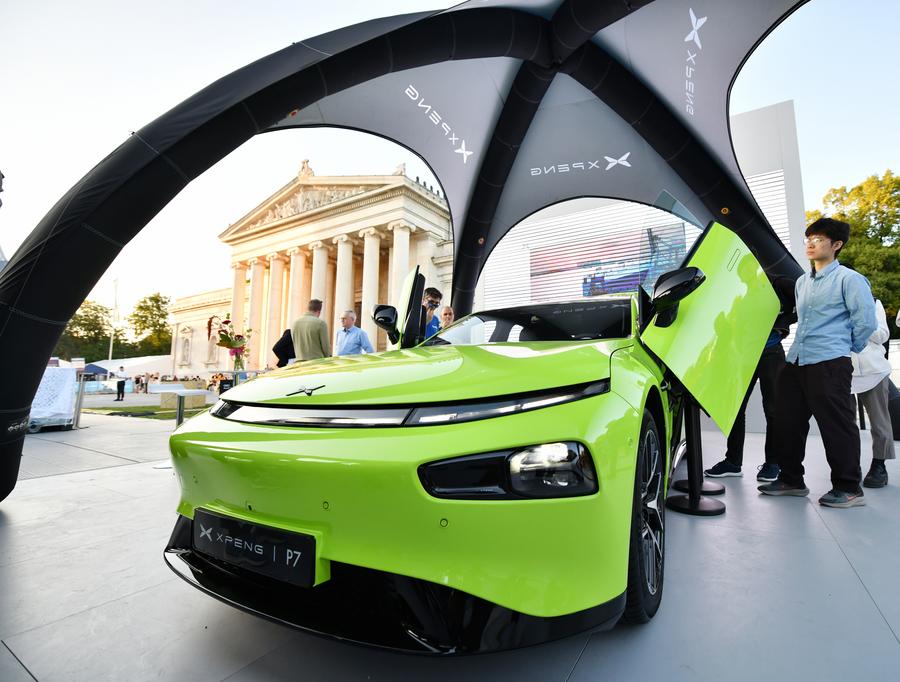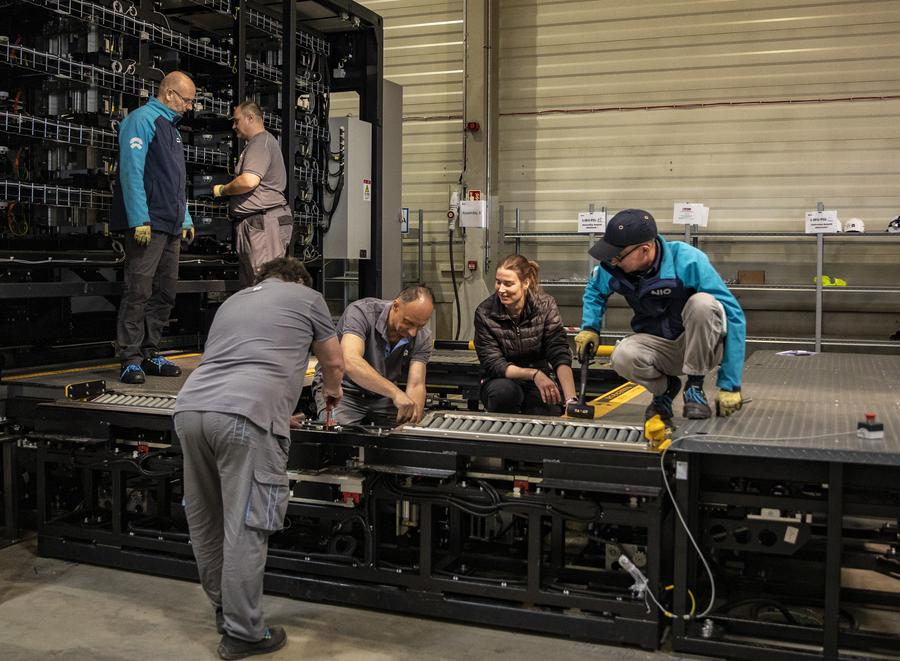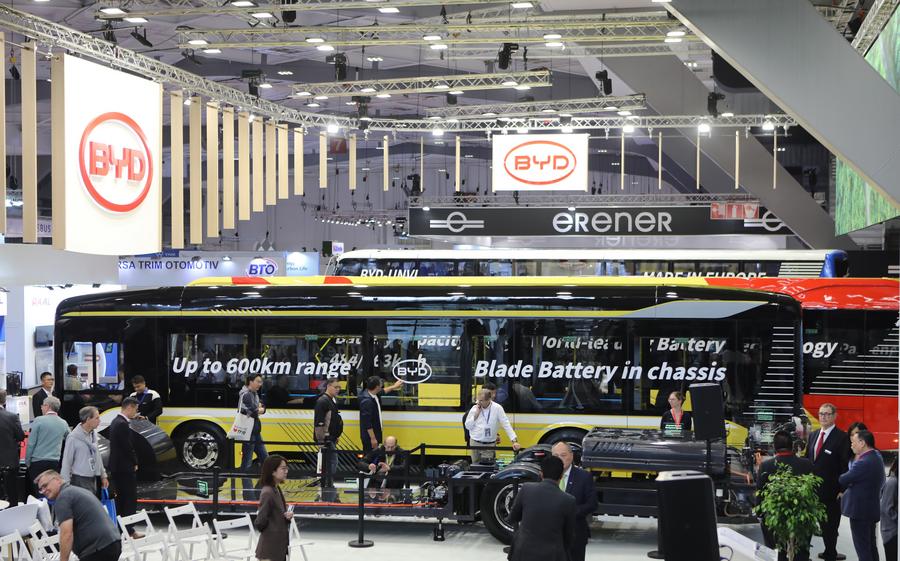Xinhua Headlines: Great potential seen in China-Europe EV cooperation towards energy transition
* With cutting-edge technology and robust products, Chinese EV companies are not just participating but are pivotal in driving Europe's green transportation revolution.
*A recent report found that over 60 percent of the 30 Chinese EV firms surveyed still consider the European market critical to their global strategies and plan to invest in Europe.
* "All parties should work together, sharing innovation infrastructure, better aligning regulatory frameworks and governance systems," said former EU Transport Commissioner Violeta Bulc.
BRUSSELS, June 22 (Xinhua) -- In a move towards a sustainable future, Chinese electric vehicle (EV) manufacturers are contributing to Europe's green transformation, as revealed in a groundbreaking new report.
Unveiled in Brussels on Wednesday, the "Report on the Development of Chinese NEV Manufacturers in Europe" showcases the synergy between China and the European Union (EU) in their shared quest for carbon neutrality.
Chinese EV manufacturers are translating their expertise into tangible progress for Europe's green transportation sector through equipment and technological support. By offering mature products and solutions, they act as catalysts for the development of local green travel systems.
 People visit the booth of Chinese carmaker Xpeng during the 2023 International Motor Show in Munich, Germany, Sept. 5, 2023. (Xinhua/Ren Pengfei)
People visit the booth of Chinese carmaker Xpeng during the 2023 International Motor Show in Munich, Germany, Sept. 5, 2023. (Xinhua/Ren Pengfei)
FRONTRUNNER IN GREEN DRIVE
With cutting-edge technology and robust products, Chinese EV companies are not just participating but are pivotal in driving Europe's green transportation revolution, highlighted by agreements such as BYD's deal with Swedish public transport leader Transdev AB.
In February 2023, the Chinese carmaker secured their largest ever order with Transdev AB for the supply of 52 electric buses. Since 2015, BYD's electric buses have been deployed in over 100 major cities across 20 European countries, making a significant contribution to sustainable public transportation, said the report.
European consumers are also showing a growing interest in Chinese EVs, attracted by their affordability, technological innovation, and extensive features. European sales of Chinese EVs jumped by 23 percent in the first four months this year compared to the same period in 2023.
"We must commend China for its leadership in decarbonization industries. It is an inspiration and a path that we must follow," former Assistant Secretary-General of the United Nations Brice Lalonde said in his opening remarks at the release.
The integration of Chinese EVs into the European market holds promise for both economic and environmental gains. Economically, competitively priced Chinese EVs could drive down costs, making electric cars more accessible to a broader range of consumers. This price competition could stimulate the market, encourage innovation among European automakers, and potentially lead to job creation in related sectors such as EV maintenance, charging infrastructure, and renewable energy.
Environmentally, the widespread adoption of EVs is critical for reducing greenhouse gas emissions from the transportation sector, one of the largest sources of carbon emissions in Europe. Chinese EVs, known for their advanced battery technology and energy efficiency, could significantly contribute to lowering emissions. This shift would be instrumental in helping European countries meet their climate goals.
 Staff members work at the NIO Power Europe Plant in Biatorbagy, Hungary, March 18, 2024. (Xinhua/Zhang Fan)
Staff members work at the NIO Power Europe Plant in Biatorbagy, Hungary, March 18, 2024. (Xinhua/Zhang Fan)
TARIFFS MAY BACKFIRE
Earlier this month, the European Commission announced provisional duties ranging from 17.4 percent to 38.1 percent to be levied on EVs imported from China. Such a move smacks of protectionism and serves no one's interests.
The report found that 73 percent of over 30 EV firms surveyed suffered a decline in sales in the European market due to the EU-launched anti-subsidy investigation. More than 80 percent of the respondents said the probe had eroded their confidence in investing in Europe in the near future, and reported concerns from their European partners, resulting in collaboration delays and less cooperation. The uncertainty also impacted employee morale, with 72 percent of those firms reporting worries among their local European staff about job prospects.
Despite these challenges, over 60 percent of these businesses believe the European market remains critical to their global strategies. They intend to expand their presence in Europe by establishing factories for EV production within the next five years. This expansion is expected to create new job opportunities, with some companies planning to hire more than 200 people locally in 2024.
"Tariffs are usually not the best way to handle trade tensions, and these particular tariffs seem counterproductive for many within the EU," said Eric De Keuleneer, executive director of the Brussels-based University Foundation.
"Consumers will have to pay them, and many EU automobile manufacturers' EV imports from China are thereby discouraged," he said.
The investigation has led to opposition from European automakers. They argued that after decades of collaboration and competition, the global automotive industry has become highly integrated. An investigation of this nature could disrupt established supply chains and hinder joint research and development efforts, ultimately harming both European and Chinese automotive industries.
 People visit the booth of Chinese automaker BYD during the Busworld Europe in Brussels, Belgium, Oct. 7, 2023. (Xinhua/Pan Geping)
People visit the booth of Chinese automaker BYD during the Busworld Europe in Brussels, Belgium, Oct. 7, 2023. (Xinhua/Pan Geping)
ROAD AHEAD
The European green transition is a complex and multifaceted endeavor, requiring concerted efforts across various sectors. The integration of Chinese EVs into the European market represents a significant step forward, and offers endless opportunities.
"The last thing we need is a trade war with escalating tariffs. In my view, engaging in bilateral discussions to address the complexity of issues is preferable," said Lalonde.
Dick Roche, former Irish minister for European affairs, agreed. Roche considered technological change a key driver of the green and digital transition in Europe, saying China is a leader in vital technologies that fuel Europe's progress towards carbon neutrality.
"The logical thing for Europe to do at this point is to recognize that reality and to sit down with China and other potential partners to hammer out solutions for any ideological, political or administrative differences that stand in the way of progress," Roche said.
Former EU Transport Commissioner Violeta Bulc told Xinhua that cooperation on smart mobility and green transportation could serve as a cornerstone for further EU-China collaboration, calling for the promotion of dialogue and other trust-building measures.
"All parties should work together, sharing innovation infrastructure, better aligning regulatory frameworks and governance systems," Bulc said. (Video reporters: Liu Yuxuan, Sun Xinjing, Peng Zhuo, Chen Gang, Shan Weiyi, Li Hanlin, Jia Jinming, Yin Xiaosheng, Jasmine Brutus; video editors: Zhang Yucheng, Wei Yin, Wang Houyuan, Cao Ying)
- Chinese EV maker Zeekr launches ultra-fast charging network in Israel
- Chinese automaker Chery launches new hybrid car in Israel
- China's automaker BYD launches premium brand DENZA in Indonesia
- Chinese autonomous driving startup to develop AI-driven car with Smart
- GLOBALink | China-Europe freight train service enhances connectivity, win-win cooperation


